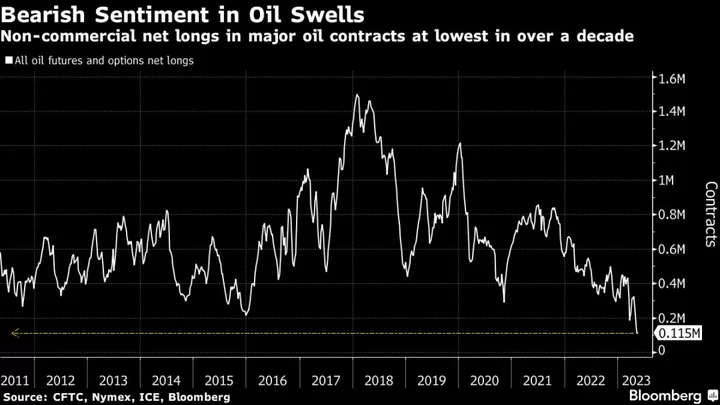Money managers that trade derivatives linked to oil and fuel prices are about as bearish as they’ve been in more than a decade, suggesting they’re braced for a recession that could cause contracts from crude to jet fuel to take another tumble.
The trading positions of non-commercial players such as hedge funds are near the most bearish levels since at least 2011 across a combination of all major oil contracts. And in bets that are perhaps most indicative of recession expectations, speculators’ combined views on diesel and gasoil — fuels that power the economy — are near the most bearish levels since early in the Covid-19 pandemic.
The gloom over the oil market this year has come from multiple directions, including expectations that the Federal Reserve’s rate hikes will provoke a contraction and China’s less-than-booming rebound from its Covid-19 restrictions. Add in the threat of a US default if politicians fail to raise the debt ceiling and the possibility that OPEC+ may not deliver all the output cuts they’ve pledged, and traders have no shortage of bear scenarios to choose from.
“It’s pretty remarkable to see this type of positioning,” Greg Sharenow, who manages a portfolio focused on energy and commodities at Pacific Investment Management Co., said in an interview.
To be sure, the investors that make up the non-commercial cohort are a diverse group with a variety of approaches, ranging from hedge funds betting on macro strategies to algorithm-driven traders focused on price momentum and trends. Positioning in gasoil and US diesel ticked slightly higher in the latest week. And commercial traders — those that work for the producers as well as other merchants of crude — aren’t so bearish, with some even reducing hedges against a potential price drop.
But the extreme extent of the financial traders’ bearishness raises the risk of volatility if the Organization of Petroleum Exporting Countries and its allies decide to cut production further. That scenario may set off a rush to exit the bets that sends oil prices surging and worsens inflation.
Goldman Sachs Group Inc. projects any large gains in oil prices could unleash as much as $40 billion worth of buying in US crude and Brent alone from trend-following commodity trading advisers, according to a note to clients seen by Bloomberg. By contrast, any big declines in prices aren’t likely to budge positioning much further, the bank forecasts.
The oil traders aren’t exactly going out on a limb with their recession bets, though. Of the 27 forecasters surveyed by Bloomberg in early May, 22 expected the US economy to slip into a contraction over the next year. However, the starting point for the downturn keeps getting pushed back as the robust labor market keeps wages growing and savings accumulated during the pandemic boost Americans’ spending power.
More broadly, the sentiment among global fund managers deteriorated to the most bearish this year, with 65% of survey participants now expecting a weaker economy, according to Bank of America Corp.’s latest survey.
Meanwhile, underlying physical markets aren’t reflecting the dire state that traders are preparing for. Refineries are processing the most crude for this time of year since the pandemic began. Air travel is rising just about everywhere, and gasoline demand in the US is now at the highest level since December 2021. At the same time, fuel inventories are below seasonal norms for gasoline and diesel in the US, and OPEC+ cuts and Canadian wildfires have limited crude supply.
Those trends have oil producers and other industry players pulling back on hedges against a drop. Positions among swap dealers — who are typically net short because they execute hedges for oil producers — are growing less bearish as some drillers buy back their protection against a sudden price decline, market participants said.
The International Energy Agency recently hiked its expectations for global oil demand growth this year on China’s post-pandemic rebound, which, despite a strong gain in consumer usage, has failed to live up to optimistic forecasts. That’s because industrial demand has been the central focus for traders, and weakness in manufacturing and trucking has kept them from going long on diesel.
“Traders are focused on China recovery, specifically if the increase in consumer-led consumption can meaningfully outstrip weakness in industrial demand,” said Rebecca Babin, a senior energy trader at CIBC Private Wealth.
Speculative traders also are hesitant to unwind bearish positions because of the ongoing stalemate in the US debt-ceiling talks. The uncertainty is negative for risk-sensitive assets, including oil, said Fawad Razaqzada, a market analyst at StoneX Group.
While a reversal of the bearish sentiment doesn’t appear imminent, a continued decline in inventories may help oil beat other asset classes.
“If you do genuinely believe that we’re in a capital-disciplined and under-investing environment, then when the economy does stabilize, commodities, and oil within that, are likely to outperform over an extended period of time,” Pimco’s Sharenow said.
--With assistance from Alex Longley.

